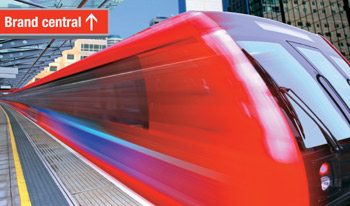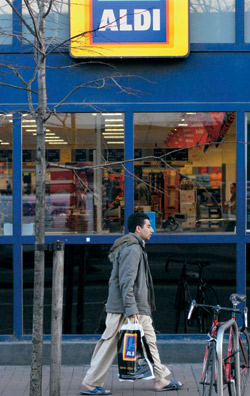Jumping on the brand wagon?

While Lidl’s branded listings have grown significantly over the past year, Aldi’s PR spotlight has remained firmly focused on the group’s private label offering.
11 February 2011
 The evolution of the discounters within Ireland has seen them leapfrog from places regarded as devoid of personality and piled depressingly high. Instead, the recession ushered in a new breed of ‘smart shoppers’ who revelled in their ability to cast snobbish hesitations aside and fully embrace a no-frills ethos. Sure, the continental own brands may have borne unfamiliar names and packaging, but constrained budgets demanded they become an acquired taste.
The evolution of the discounters within Ireland has seen them leapfrog from places regarded as devoid of personality and piled depressingly high. Instead, the recession ushered in a new breed of ‘smart shoppers’ who revelled in their ability to cast snobbish hesitations aside and fully embrace a no-frills ethos. Sure, the continental own brands may have borne unfamiliar names and packaging, but constrained budgets demanded they become an acquired taste.
Now another volte-face in Irish consumers’ perception of the discounters Aldi and Lidl is occurring. A change stemming from trends that have been gathering pace throughout 2010 and into the new year.
Brands central
At Lidl, branded goods are increasingly jumping off the shelves. Nescafé, Lloyd Grossman, 7UP, HP, Galtee, Jacob’s, Tayto and Tropicana. Actually, never mind the shelves – these are just some of the brands jumping off the pages of one of the discounter’s frequent newspaper inserts highlighting its special offers. The curious new customer will find many more of their favourite brands await them if they take the bait and venture in store.
No reading between the lines of such adverts is required in order to realise that Lidl’s plan of action centres around delivering a strong branded range. Yet rival discounter Aldi appears unmoved by this display of branded prowess, and is instead sticking to its tried and tested own brand-led offensive. “Aldi’s focus is on providing our customers with a quality private label grocery offering at prices significantly cheaper than the market,” a spokesperson told ShelfLife. “Approximately 99% of the products you will find at Aldi are private label lines. We have experienced a strong, positive response to our private label products from Irish consumers.”
Distinct identities
Within analysis of Ireland’s FMCG sector, the German discounters tend to be lumped together as a distinct format, but their differing stance on branded lines is also increasingly creating separate identities for the two groups. To use a home-grown analogy – Lidl can be viewed as the Tesco of Ireland’s discounter sector whereas Aldi is a touch more Superquinn – albeit it with significantly better growth than the premium Irish store.
But which approach is working best? According to the latest grocery market figures from Kantar Worldpanel, for the 12 weeks ending 26 December 2010, Aldi was the star performer in terms of achieving growth. The analyst reported that “Aldi continued to post excellent growth at 22.9%, increasing its sales by €15million with strong sales across the alcohol, ambient food and fresh and chilled sectors. Conversely Lidl’s growth slowed from 9.4% in the last period to 6.7% in the run up to Christmas.”
Branded products also took a hit during the all-important festive season with “own label ranges growing in value by 5% and branded lines remaining flat.”
Bearing this is mind, is Lidl backing the wrong horse by bolstering its branded supplies? Should it be concentrating on delivering what consumers expect in the discounter sector, namely value-for-money private label offerings? No, says Kantar Worldpanel commercial director David Berry, who tells ShelfLife Lidl’s strategy is yielding a good return for the group. “Lidl continue to gain [market share]. They didn’t have as strong a Christmas as Aldi, yet this is only a small part of the year even though it is a very important one. I think anecdotally Aldi did a very good job of communicating some of its more premium offerings over Christmas, so maybe it was able to distinguish itself from Lidl.”
Premium offerings
When contacted by ShelfLife, Aldi’s spokesperson did a similarly good job at flagging the premium status of its private label lines, stating all products “are tested and compared against the leading brand in their category to ensure they are at the cutting edge of quality and value.” Many of Aldi’s own brand goods are also sourced from leading Irish producers and suppliers. What’s more, Aldi’s Irish products netted 12 awards at the 2010 Blas na hÉireann National Irish Food Awards; “more than any other retailer in Ireland.”
This success is another testament to the fact that Irish shoppers’ perception of own brand goods has evolved from the ‘yellow packs’ of old to products that can encapsulate both quality and value. So does this mean the traditional Irish loyalty to branded goods is on the wane? A thought-provoking statistic from Kantar Worldpanel Ireland is that the own brand value share of the Irish grocery market has grown from 16% in 2001 to 33.1% last year and is expected to grow further this year.

The own brand value share of the Irish grocery market has grown from 16% in 2001 to 33.1% last year and is expected to grow further this year

The own brand value share of the Irish grocery market has grown from 16% in 2001 to 33.1% last year and is expected to grow further this year
Loyalty intact
While it’s undeniable therefore that own brand products have experienced phenomenal growth in recent years, Kantar’s David Berry believes this growth should be kept in perspective. “Almost 50% of what people buy in grocery is branded, so yes there’s very much still a strong loyalty to branded goods but it is reducing. It does look like that will continue to reduce. I think it does depend quite a lot on categories; own label does work well within certain categories whereas in others it won’t work so well.”
Brands subsequently still occupy a key role within the Irish grocery market, and while Aldi (with 3.6% market share) may have stolen a march on its larger rival over Christmas, Lidl’s market share has now grown to 5.6%, so the group’s branded strategy does appear to be working. But is partnering with Lidl also delivering similar dividends for the brands?
“I think given the difficulty of achieving any growth, that it has to be there as an option for brands,” argues David Berry. “We would record the discounters as having about 10% share of grocery, so for a brand to increase its category share by 1% then it would have to gain 10% of everything that’s sold in the discounters. So yes, it can help but it has to be one of the options open to brand owners rather than relying on it to help their overall growth.”
Appealing growth
Given that brands invest heavily in creating the right image for their products, some commentators have previously argued that placing those brands within a discount retail environment involves an inherent risk of devaluing their worth. However Berry believes this doesn’t pose a problem for most “mainstream brands”, because “the discounter has gone beyond having a niche appeal” and does now have “a broader appeal.” However brands that “push themselves as being very premium” could suffer because “all the touch points that a brand has with a consumer should try and reflect what a brand stands for,” meaning “a non-premium outlet isn’t necessarily going to work well for them.”
Conor Kilduff, managing director of Unilever Ireland, presents the argument from the supplier’s point of view. “Our policy is to ensure we can reach all our consumers through a multiplicity of channels. Discounters have grown their share of the Irish market in recent years and it is important that our products are on sale wherever our consumers wish to shop.”
Sharon Colgan, programme director of the Love Irish Foods initiative, also notes “a number of Love Irish Food brands have some product representation in discounters. With increased shopping occasions in discounters it is possible that some Irish brands see that they should be represented in this grocery environment.”
Breaking into convenience
Lidl’s relationship with brands is therefore clearly one grounded on mutual benefit. Yet considering the two discounters’ increasingly divergent paths, what lies ahead for both Lidl and Aldi stores? The straightforward answer according to David Berry is further growth. “Just hunting around the newspapers, they’ve got a lot of planning applications under consideration. I think Lidl in particular is planning to break into the convenience market in Dublin so yes it has definitely got plans to keep opening stores, and that will lead to growth.
“I think also, people definitely over the next six months or so, they are going to become even more value-conscious when the effect of the Budget comes through and actually starts to affect their take-home pay.”
Lidl’s foray into the convenience arena is one he believes is signposted by both the location and format of certain stores. In urban areas such as Dublin, Lidl’s stores aren’t in out-of-town locations, but central sites with high footfall. He says Lidl has also trialled a shop with an in-store bakery in north Dublin; “something completely new for them in Ireland.” The group is also increasingly “trying to go after the lunchtime trade” with traditional convenience offerings such as sandwiches.
One-stop shops?
Just a couple of years ago, Lidl benefited from the National Consumer Agency’s (NCA) pleas for consumers to “shop around”, but now it appears it would like to be viewed as a one-stop grocery shop. Evidence of this can be seen through Lidl’s rolling out of its first ever news and magazine category in partnership with Newspread, which according to the distributor, has been “a huge success based on magazine EPOS sales.”
Berry believes a one-stop-shop ethos will form “a big plan” for Lidl, noting that it does “a very good job of getting lots of people in through the door, but the opportunity is to try and get them back more often, so they do see it as being their main shop, and are not just going there for a few categories.” Others in the retail industry may be not so pleased Lidl is branching out in this fashion. National Federation of Retail Newsagents (NFRN) Ireland vice president Joe Sweeney tells ShelfLife: “Any multiple or discounter selling newspapers is of course a threat to independent newsagents’ business,” yet he also notes that independent newsagents give customers “a better service and a wide choice” compared to a “restricted” pay per scan range. “This fact offers independent newsagents some comfort now but we know this could change in the future,” he adds.
With the onward march of both discounters therefore unrelenting, it is unclear whether a branded or own brand led strategy will prove the ultimate market share winner. What is clear however is that the discounters can no longer be relegated to the sidelines of the Irish grocery market. The Germans aren’t content to be subservient foot-soldiers, but innovative leaders who will play to the home crowd in order to carve out their successful retail destiny.



 Print
Print






Fans 0
Followers